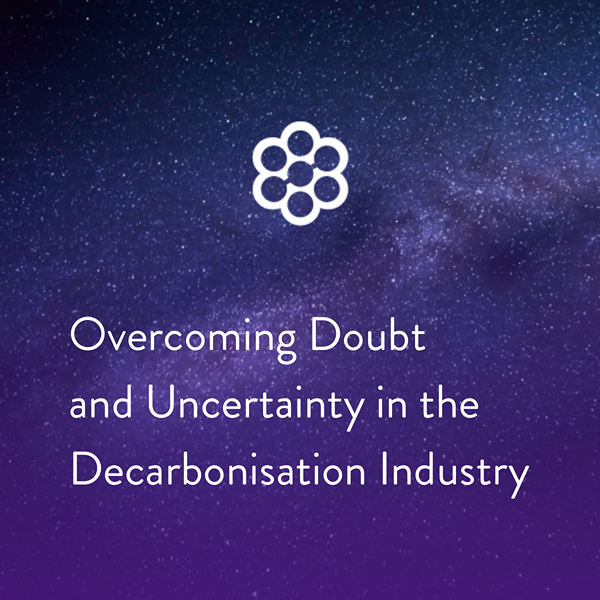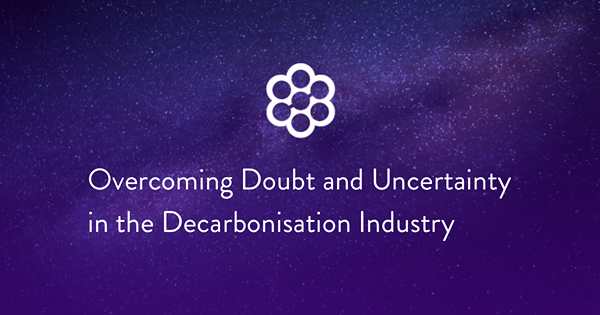Overcoming Doubt and Uncertainty in the Decarbonisation Industry


In our first blog of this series we introduced the decarbonisation industry, which engages in the calculation, reduction, and offsetting of greenhouse gas emissions within businesses. As the industry has experienced significant growth in recent years, concerns have been raised about the quality and accuracy of carbon footprint calculations, the credentials of those completing them, and the validity of using carbon credit projects as way to mitigate emissions. These are key issues. Ones that we think deserve a bit more attention...
What standard are we standing by?
Navigating the decarbonisation industry can be akin to finding a path through a dense fog. The landscape is often obscured by varied and contrasting standards of reporting on emissions, causing doubt and uncertainty for many companies.
Existing standards such as the Greenhouse Gas Protocol and ISO-14064 offer a solid foundation. They provide methodologies to measure and manage greenhouse gas emissions and outline guidance for corporate greenhouse gas accounting and verification. However, the methodologies leave room for interpretation when it comes to assumption and boundary management, resulting in a stark disparity in their application across companies and industries, where the accuracy of data used can swing from meticulously precise to loosely approximate.
Even more concerning is the prevalence of "black box" reporting, where methodologies are undisclosed and calculations are shrouded in secrecy. Such a lack of transparency inhibits accountability and makes it increasingly difficult to gauge the authenticity and impact of a company's reported reductions. Moreover, it can impede progress towards tangible, impactful environmental reductions. If a company cannot accurately measure its emissions, how can it effectively strategise to reduce them?
The inconsistencies in reporting also have a consequence on the broader industry and our overall battle against climate change. Without widespread credible emission reporting, the trust in the industry is undermined, discourages investment in decarbonisation efforts, inhibiting collaborative action against climate change.
Overcoming these challenges and establishing universally accepted, transparent standards and reporting are critical. Not just for the credibility of the decarbonisation industry, but for the overall success of our global endeavour to mitigate climate change. It is a challenge we must face head-on, standing firmly by standards that facilitate accountability, transparency, and measurable progress towards a sustainable future.
Dr. Toby Green, co-founder of MyCarbon, highlights the importance of accurate calculations, stating"We believe in empowering businesses with a clear methodology that ensures their carbon footprint is accurate and comparable. At MyCarbon, we really take the five principles of the Greenhouse Gas Protocol to heart: transparency, relevancy, accuracy, completeness, and consistency. We ensure that every report that we complete embodies those principles. We want to ensure that a client could re-calculate their carbon footprint and get the same result. We feel that this process and transparency helps empower the client, leading to further and effective climate action."
What about Carbon Integrity?
Meanwhile, the voluntary carbon market faces similar credibility concerns regarding carbon credit projects and the true environmental impact of offsetting emissions. Which leaves companies that are struggling to reach their sustainability goals, and the wider climate community at a crossroads on how to move forward.
Recent investigations have highlighted issues with emission claims and project integrity, which has had a knock-on effect on the overall potential reduction efforts of some high profile companies. Discussions are ongoing as to how the market should proceed. Should we dismiss any offsetting action, and ignore the potential of high-quality, high-impact projects that are genuine in mitigating global heating? Is the answer to reject the market completely, or rather work towards developing a more robust carbon market?
Eva Båsk, Head of GoodZero, addresses this question, stating: “At GoodZero, we believe that carbon credits must be utilised by companies to offset their truly unavoidable emissions, while recognising that a widespread overhaul of transparency within the voluntary carbon market needs to be undertaken. Therefore, we have decided to create GoodCriteria as a secondary evaluation process to evaluate projects on both carbon impact and carbon integrity. Our philosophy is quality over quantity, and that’s how it will remain.”
Who's paying who?
Another challenge is the perverse financial incentives in the market. Verifiers get paid per certified credit, and project developers get paid per credit sold, so both parties gain by creating more credits. This can create conflicts of interest and may lead to the creation of low-quality credits.
GoodZero takes a proactive approach by investigating these incentives through their credit clarity lens, which is nestled within their GoodCriteria evaluation process. Eva Båsk, Head of GoodZero, states, "We only collaborate with developers who can demonstrate that the lion's share of carbon credit revenue goes back to the project and wider community.”
Harnessing Collaboration
The challenges facing the industry are significant, but with a commitment to accuracy, transparency, and high-quality services, companies like GoodZero and MyCarbon can help businesses navigate this complex space and achieve their sustainability goals. By collaborating, we can create a more sustainable future for ourselves and for future generations. Get in touch to learn more!






